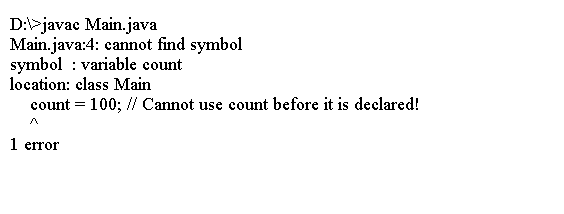Java教程 - Java变量
变量由标识符,类型和可选的初始化程序定义。变量还具有范围(可见性/生存期)。
Java变量类型
在Java中,必须先声明所有变量,然后才能使用它们。变量声明的基本形式如下所示:
type identifier [ = value][, identifier [= value] ...] ;
变量定义有三个部分:
- 类型可以是int或float。
- identifier是变量的名称。
- 初始化包括等号和值。
int a, b, c; // declares three ints, a, b, and c. int d = 3, e, f = 5; // declares three more ints, initializing d and f.
以下变量在一个表达式中定义和初始化。
public class Main {
public static void main(String[] args) {
byte z = 2; // initializes z.
double pi = 3.14; // declares an approximation of pi.
char x = 'x'; // the variable x has the value 'x'.
}
}
在声明之前不能使用变量。
public class Main {
public static void main(String[] args) {
count = 100; // Cannot use count before it is declared!
int count;
}
}
编译上面的代码会生成以下错误消息:

赋值运算符
赋值运算符是单个等号,=。它有这种一般形式:
var = expression;
var 的类型必须与表达式的类型兼容。赋值运算符允许创建一个赋值链。
public class Main {
public static void main(String[] args) {
int x, y, z;
x = y = z = 100; // set x, y, and z to 100
System.out.println("x is " + x);
System.out.println("y is " + y);
System.out.println("z is " + z);
}
}
输出:

动态初始化
Java允许变量被动态初始化。在下面的代码中,Math.sqrt返回2 * 2的平方根,并将结果直接赋值给c。
public class Main {
public static void main(String args[]) {
// c is dynamically initialized
double c = Math.sqrt(2 * 2);
System.out.println("c is " + c);
}
}
上面代码的输出是
